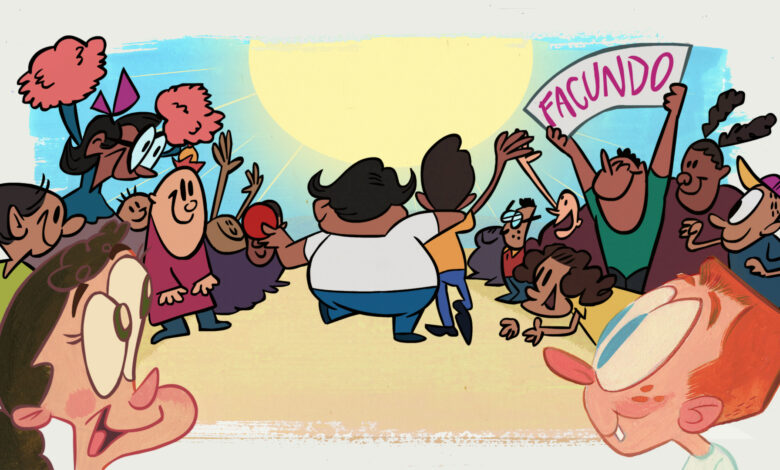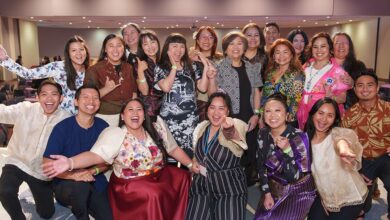Celebrating Hispanic Heritage Month – StoryCorps

In recognition of National Hispanic Heritage Month, we’re highlighting the stories that uplift Latine* voices as they share triumphs, achievements, legacies, and lived experiences from across the United States. As you listen to the stories below, take a moment to reflect on what heritage means to you and how you consider inclusivity in your day-to-day life.
Know any voices that are missing from the narrative of Latine history and heritage?
From StoryCorps Historias
Listen to and share stories from StoryCorps Historias, our initiative to record the diverse stories and life experiences of Latine people in the United States. You can also find our full collection of Historias stories here.
Ramón “Chunky” Sanchez remembers how teachers at his elementary school anglicized the Mexican American students’ names. But one name stumped them all.
When Gilbert Zermeño dreamed of joining his school band, he pictured himself playing a shiny saxophone. To his dismay, his family—getting by on the $100 a week that his father made working in the nearby cotton fields—couldn’t afford one. At StoryCorps, he shares with his wife, Patricia Powers-Zermeño, how his musical journey began on a bad note, but ended in harmony.
“I remember he had the white boots, the white mask, with kind of like a red beak.”
0:00 / 0:00
John Torres, Jr. came to StoryCorps with his dad’s best friend and fellow wrestler, Abraham Guzman, to remember John, Sr. and his stardom as a Lucho Libre Wrestler in the Bronx.
“I ask myself, why did I become a nurse? And it’s to do this kind of work.”
0:00 / 0:00
Angelina McCall graduated from nursing school at the height of the COVID-19 pandemic. After leaving her first nursing job at a Tucson emergency room, she began to question if she was cut out for the profession. At StoryCorps, Angelina shares a decision that reconnected her with her passion to help.
“There’s vultures circling all the time.”
0:00 / 0:00
Maria Ochoa, a 70-year-old grandmother, speaks about the many times she’s walked the Arizona desert, providing legal, life-saving water and aid to migrants crossing the border from Mexico.
“Having two different cultures … that was my entire life.”
0:00 / 0:00
Angelina McCall graduated from nursing school at the height of the COVID-19 pandemic. After leaving her first nursing job at a Tucson emergency room, she began to question if she was cut out for the profession. At StoryCorps, Angelina shares a decision that reconnected her with her passion to help.
“There’s vultures circling all the time.”
0:00 / 0:00
Maria Ochoa, a 70-year-old grandmother, speaks about the many times she’s walked the Arizona desert, providing legal, life-saving water and aid to migrants crossing the border from Mexico.
“I am different, and that is special.”
0:00 / 0:00
Luz Kenyon grew up in Mexico City, Mexico and in the mid 1980s she took a trip to New York City to celebrate her friend’s college graduation. She had no idea she would fall in love with a Jamaican traffic agent on the corner of 42nd street, and never go home. She came to StoryCorps with her daughter, Anna Paloma Williams, to talk about this unexpected start to their family, and how she navigated raising mixed kids in America.
Amor Eterno: Remembering Ana Guissel Palma on Día de los Muertos
0:00 / 0:00
In 2016, Cesar Viveros and his wife Ana Guissel Palma set out to document Day of the Dead altars in South Philadelphia—a thriving Mexican and Central American community. The pair went door-to-door, recording stories across their neighborhood in the hopes of creating a large community altar for people to visit and remember their loved ones. But two years into the project, Ana became sick, and passed away just before Day of the Dead, leaving Cesar to finish the project on his own. He came to StoryCorps with his niece, Kathy Lopez, to honor her.
“She gave people the license to be themselves.”
0:00 / 0:00
Oswaldo Gómez, better known as Ms. Colombia, brightened one of New York City’s most popular beaches for decades with her colorful traditional Colombian skirts and green beard. Originally a lawyer, she immigrated to New York in 1975, earning the nickname Ms. Colombia by offering free legal advice to fellow Colombians. Her close friends, Victoria Cruz and Carlos Villacres, came to StoryCorps to share their memories of her.
“He was proud he was able to help save one of his fellow pilots.”
0:00 / 0:00
Lt. Col. Miguel Encinias was a military pilot at a time when combat pilots of Hispanic heritage were almost unheard of. At StoryCorps, Isabel and Juan Pablo Encinias reflect on their hero — their father — and his love for flying.
Bishop Ricardo Ramierez remembers his grandmother Panchita Espitia as a formidable and wise woman. He shares her memory and the valuable spiritual lesson she taught him at the end of her days.
Want to listen to more StoryCorps stories? Sign up for our Story of the Week newsletter to discover a new voice every week.
Looking for more activities related to Hispanic Heritage Month?
Check out a digital exhibition presented as part of our collaboration with the American Folklife Center and the Hispanic Division at the Library of Congress.
*Throughout the brief history of this month-long commemoration multiple words have been used including Hispanic, Latino, Latina, Latinx and now Latine to highlight individuals whose roots tie them to Latin America. At StoryCorps, we try our best to be inclusive of all individuals, from any background. In doing so, we want to share our reasoning behind our wording. We believe that any individual should be free to use the word that they most identify with, and with the goal of creating inclusive spaces in mind, we will be using the word Latine as we share stories for Hispanic Heritage Month, and beyond. Latine is a gender-neutral version of Latino and Latina, that uses an -e instead of an -x (such as in Latinx), and can be considered more inclusive for Spanish and English speakers alike.




